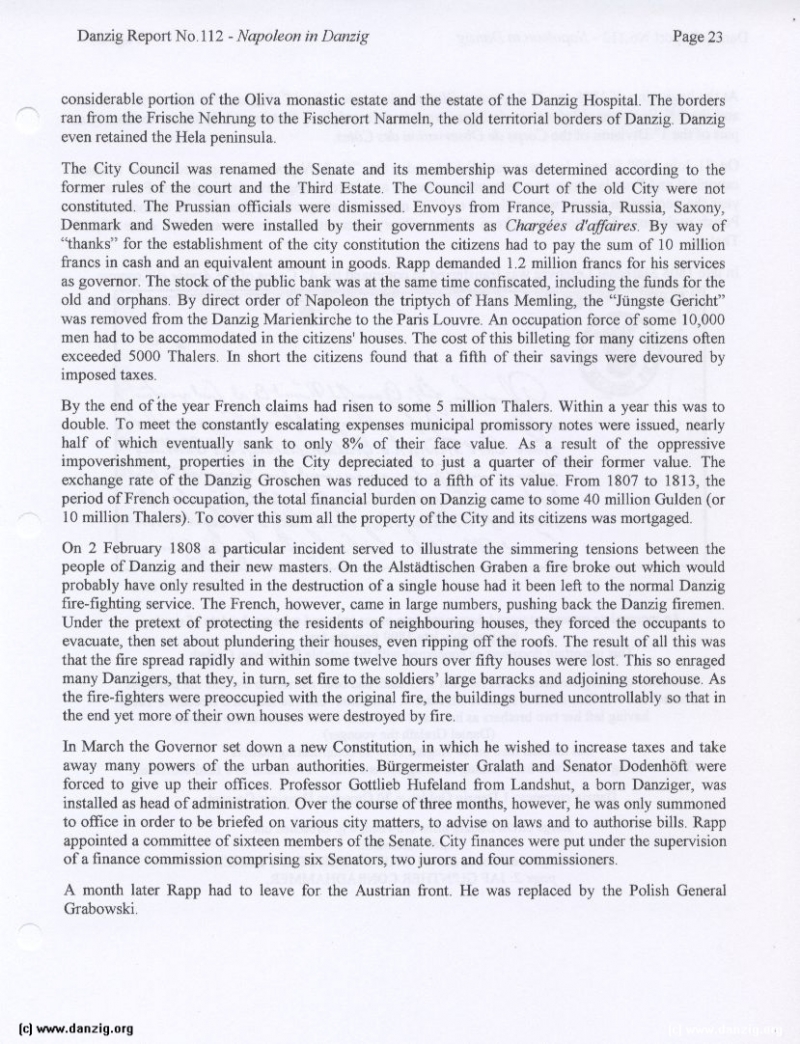
considerable portion of the Oliva monastic estate and the estate of the Danzig Hospital. The borders ran from the Frische Nehrung to the Fischerort Narmeln, the old territorial borders of Danzig Danzig even retained the Hela peninsula
The City Council was renamed the Senate and its membership was determined according to the former rules of the court and the Third Estate. The Council and Court of the old City were not constituted. The Prussian officials were dismissed. Envoys from France, Prussia, Russia, Saxony, Denmark and Sweden were installed by their governments as (‘hargées d’affaires By way of “thanks” for the establishment of the city constitution the citizens had to pay the sum of 10 million francs in cash and an equivalent amount in goods. Rapp demanded 1.2 million francs for his services as governor. The stock of the public bank was at the same time confiscated, including the finds for the old and orphans. By direct order of Napoleon the triptych of Hans Memling, the “Jungste Gericht” was removed from the Danzig Marienkirche to the Paris Louvre. An occupation force of some 10,000 men had to be accommodated in the citizens’ houses. The cost of this billeting for many citizens often exceeded 5000 Thalers. in short the citizens found that a fifth of their savings were devoured by imposed taxes.
By the end of the year French claims had risen to some 5 million Thalers. Within a year this was to double. To meet the constantly escalating expenses municipal promissory notes were issued, nearly half of which eventually sank to only 8% of their face value, As a result of the oppressive impoverishment, properties in the City depreciated to just a quarter of their former value. The exchange rate of the Danzig Groschen was reduced to a fifth of its value From 1807 to 1813, the period of French occupation, the total financial burden on Danzig came to some 40 million Gulden (or 10 million Thalers). To cover this sum all the property of the City and its Citizens was mortgaged
On 2 February 1808 a particular incident served to illustrate the simmering tensions between the people of Danzig and their new masters. On the Alstädtischen Graben a fire broke out which would probably have only resulted in the destruction of a single house had it been left to the normal Danzig fire-fighting service. The French, however, came in large numbers, pushing back the Danzig firemen Under the pretext of protecting the residents of neighbouring houses, they forced the occupants to evacuate, then set about plundering their houses, even ripping off the roofs. The result of all this was that the fire spread rapidly and within some twelve hours over fifty houses were lost. This so enraged many Danzigers, that they, in turn, set fire to the soldiers’ large barracks and adjoining storehouse. As the fire-fighters were preoccupied with the original fire, the buildings burned uncontrollably so that in the end yet more of their own houses were destroyed by fire.
In March the Governor set down a new Constitution, in which he wished to increase taxes and take away many powers of the urban authorities. Burgermeister Gralath and Senator DodenhOft were forced to give up their offices. Professor Gottlieb Hufeland from Landshut, a born Danziger, was installed as head of administration, Over the course of three months, however, he was only summoned to office in order to be briefed on various city matters, to advise on laws and to authonse bills. Rapp appointed a committee of sixteen members of the Senate. City finances were put under the supervision of a finance commission comprising six Senators, two jurors and four commissioners.
A month later Rapp had to leave for the Austrian front. He was replaced by the Polish General Grabowski.
Danzig Report Vol. 1 - Nr. 112 - July - August - September - 2001, Page 23.
Hits: 2649
Added: 30/07/2015
Copyright: 2024 Danzig.org

